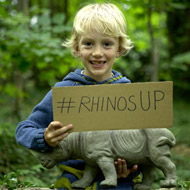
Six-year-old Frankie launches RhinosUp project
A six-year-old boy from Cambridge has devised a plan to save one of the world’s rarest species of rhino from extinction.
After finding out that there are just three northern white rhinos left in the world, Frankie Benstead decided to launch a fundraising project called RhinosUp.
His novel idea is to create a piece of public art in one of his local parks. The piece would be a living sculpture, made out of bee-friendly flowers, in the shape of a northern white rhino. In Frankie’s words, he’d like “the flowers to come UP and the rhinos to come UP from the dead. That’s why I call it RhinosUp.”
Frankie has presented his proposal to Cambridge City Council and is working with them to make his dream become a reality.
In recent years, the surge in poaching for rhino horn has seen record numbers of rhino killed. The three remaining northern white rhino live at Ol Pejeta Conservancy in Kenya, where they are kept under constant watch from poachers.
Partnering with Fauna & Flora International, Frankie hopes the flowerbed will encourage people to think about what is happening to rhinos.
His goal is to raise a staggering £48,000 - equal to a single rhino horn on the black market. Frankie said this is a modest target if we are to “show that poaching and extinction has to end.”
The funds will go towards Ol Pejeta Conservancy’s work to protect rhinos. Not only is this home to the remaining northern white rhinos, but it also boasts East Africa’s largest population of black rhinos - another endangered species.
Image (C) Tom Aveling.



 The Veterinary Medicines Directorate (VMD) is inviting applications from veterinary students to attend a one-week extramural studies (EMS) placement in July 2026.
The Veterinary Medicines Directorate (VMD) is inviting applications from veterinary students to attend a one-week extramural studies (EMS) placement in July 2026.